
The Danville Political Club was a debating society based in Danville, Kentucky from 1786 to 1790.

The Danville Political Club was a debating society based in Danville, Kentucky from 1786 to 1790.
There are very few extant contemporary references to the Political Club. A U.S. army paymaster by the name of Major Beatty wrote in his journal that, while staying in Danville, he and his companions were "very much disturbed by a Political Club which met in the next house where we slept and kept us awake till 12 or 1 o'clock." Also, two letters mentioning the club were written from Peter Tardeveau, a member of the club, to two other members. Beyond this, no references to the club have been found. Whether the club was meant to be kept secret or the lack of references to it was purely accidental is not known. [1]
The existence of the club may never have been known if not for the discovery made by Thomas Speed II in 1878. Speed, the grandson of the club's secretary Thomas Speed, discovered a bundle of papers labeled "Political Club papers" while cleaning out his grandfather's desk. The elder Thomas Speed had kept meticulous notes of the club's activities throughout its existence, though some were scribbled on bits of newspapers and old letters. Speed's grandson published the documents through The Filson Historical Society in 1894. [2]
According to the club's first constitution, new members of the club had to be elected unanimously. [1] Later, the requirement was lowered to a two-thirds majority. [1]
Thirty men belonged to the club at one time or another, though no more than fifteen were ever present at any given meeting. [3] [4] A list of these members follows, with founding members listed in italics:

So prominent were these men in the history of Kentucky that Thomas Speed II opined "Full and complete biographies of some of the members would present a history of Kentucky from the beginning of its settlement past the first quarter of the ensuing century." [5] Eleven different club members participated in at least one of the ten constitutional conventions that helped separate Kentucky from Virginia. [6] Samuel McDowell was president and Todd was secretary of the 1792 convention that produced the first Kentucky Constitution. [7]
The Kentucky Society for the Promotion of Useful Knowledge was closely associated with the Danville Political Club. Fifteen men were members of both organizations, and some believe the Society was an adjunct of the Danville Political Club. Both organizations were active at about the same time and frequently debated the same or similar subjects. [8]
The first meeting of the Political Club was at the residence of Samuel McDowell on the night of December 27, 1786. [9] The founding members of the club resolved to invite Muter, Short, Ormsby, Johnson, Tardeveau, Allen, William McDowell, Thomas Speed, and James Overton to join the club. [10] Also at the first meeting, Innes, Greenup, Belli, and John Brown were tasked with drafting a constitution for the club. [11]
While studying at The College of William & Mary, Brown had been a member of the first ever chapter of Phi Beta Kappa, and he borrowed heavily from that organization's constitution. [12] Consequently, by the second meeting, held a week later at the home of Thomas Barbee, Brown was able to present a draft document to the club. [11] [13] After two readings and several amendments, the constitution was approved. [11]
Initially, meetings took place on Saturday nights at Grayson's Tavern in Danville, although fewer than half of the club's members were residents of that city. [4] [14] In May 1787, the club relocated their meetings to the courthouse in Danville and convene at 3:30 PM. [15] Fines were levied against members for being late to meetings, leaving a meeting early, or missing a meeting without an acceptable excuse. [16] (One acceptable excuse was the wooing of a woman, but only if doing so out-of-town.) [16] Six members were considered a quorum, and at each meeting, a president was elected for the duration of that meeting. [13] The club's constitution also called for the election of a secretary and treasurer who would serve until removed or unable to execute their duties. [13] Thomas Speed was chosen as the secretary and Thomas Allin was chosen treasurer at the second meeting. [17]
The topic of debate for each night was selected a month in advance. [14] Some nights, the topic was related to the district of Kentucky's relationship to Virginia; other nights it was national in scope. [4] For several consecutive meetings, the members debated the federal constitution, clause by clause, and suggested amendments. [4] The resulting document was found in Thomas Speed's desk under the title "The Constitution of the United States as Amended and Approved by the Political Club." [4] Perhaps the most remarkable suggestion was offered by George Muter on February 23, 1788: "[T]he Federal Constitution ought to be preceded by a Declaration of Rights!" [18] [19] A committee composed of Innes, Greenup, Belli, Craddock, Todd, and John Brown were charged with drafting such a declaration, but if they carried out this charge, the result has been lost to history. [18]

Danville is a home rule-class city in Boyle County, Kentucky, United States. It is the seat of its county. The population was 17,236 at the 2020 Census. Danville is the principal city of the Danville Micropolitan Statistical Area, which includes all of the Boyle and Lincoln counties. In 2001, Danville received a Great American Main Street Award from the National Trust for Historic Preservation. In 2011, Money magazine placed Danville as the fourth-best place to retire in the United States. Centre College in Danville was selected to host U.S. vice-presidential debates in 2000 and 2012.

The governor of the Commonwealth of Kentucky is the head of government in Kentucky. Sixty-two men and one woman have served as governor of Kentucky. The governor's term is four years in length; since 1992, incumbents have been able to seek re-election once before becoming ineligible for four years. Throughout the state's history, four men have served two non-consecutive terms as governor, and four others have served two consecutive terms, the most recent being current governor Andy Beshear, who was re-elected to a second term on November 7, 2023. Kentucky is one of only five U.S. states that hold gubernatorial elections in odd-numbered years.
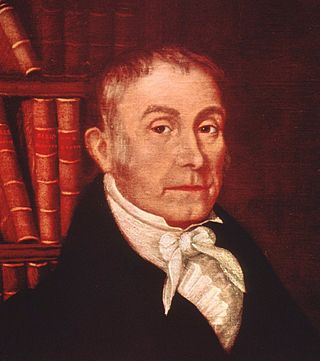
Ephraim McDowell was an American physician and pioneer surgeon. The first person to successfully remove an ovarian tumor, he has been called "the father of ovariotomy" as well as founding father of abdominal surgery.
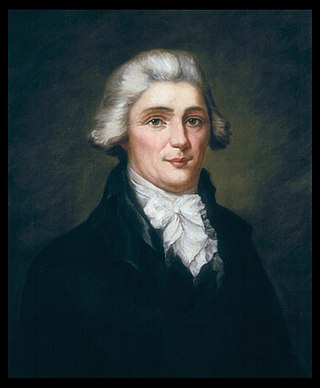
Christopher Greenup was an American politician who served as a U.S. Representative and the third Governor of Kentucky. Little is known about his early life; the first reliable records about him are documents recording his service in the Revolutionary War where he served as a lieutenant in the Continental Army and a colonel in the Virginia militia.

John Adair was an American pioneer, slave trader, soldier, and politician. He was the eighth Governor of Kentucky and represented the state in both the U.S. House and Senate. A native of South Carolina, Adair enlisted in the state militia and served in the Revolutionary War, during which he was twice captured and held as a prisoner of war by the British. Following the War, he was elected as a delegate to South Carolina's convention to ratify the United States Constitution.

James Garrard was an American farmer, Baptist minister and politician who served as the second governor of Kentucky from 1796 to 1804. Because of term limits imposed by the state constitution adopted in 1799, he was the last Kentucky governor elected to two consecutive terms until the restriction was eased by a 1992 amendment, allowing Paul E. Patton's re-election in 1999.
Alexander Scott Bullitt was an American pioneer, planter, slaveowner, and politician from Virginia who became an early settler in Kentucky and a politician during the early days of Kentucky statehood.
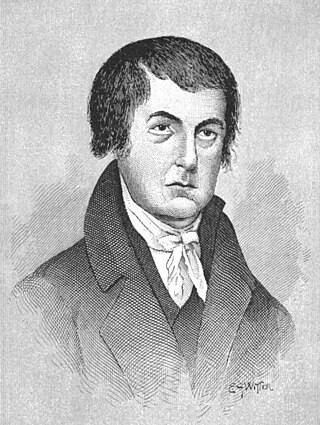
Humphrey Marshall was a politician from the U.S. states of Virginia and Kentucky. He served in the state legislatures of both states and represented Kentucky in the United States Senate from 1795 to 1801. He was a member of the Marshall political family which included his cousins Chief Justice of the United States John Marshall, federal judge James Markham Marshall, and noted educator Louis Marshall. All the prominent members of this family were Federalists. Marshall was also the father of Congressman Thomas Alexander Marshall and the grandfather of Congressman and Confederate General Humphrey Marshall.

Lawrence Winchester Wetherby was an American politician who served as Lieutenant Governor and Governor of Kentucky. He was the first of only two governors in state history born in Jefferson County, despite the fact that Louisville is the state's most populous city. The second governor born in Jefferson County is the incumbent governor, Andy Beshear.
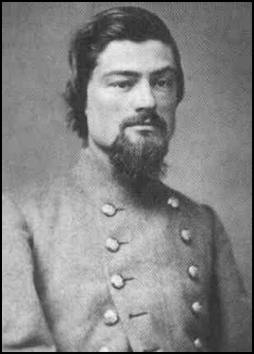
Basil Wilson Duke was a lawyer in Kentucky and a Confederate general officer during the American Civil War. Afterward, he achieved renown as a historian. His most notable role in the war was second-in-command to his brother-in-law John Hunt Morgan. Duke later wrote a popular account of what was called Morgan's Raid (1863). He took over Morgan's command in 1864 after U.S. soldiers killed Morgan. At the end of the war, Duke served among Confederate President Jefferson Davis's bodyguards after his flight from Richmond, Virginia, through the Carolinas.
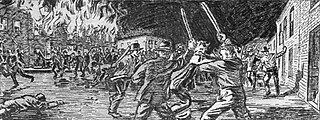
Bloody Monday was a series of riots on August 6, 1855, in Louisville, Kentucky, an election day, when Protestant mobs attacked Irish and German Catholic neighborhoods. These riots grew out of the bitter rivalry between the Democrats and the Nativist Know-Nothing Party. Multiple street fights raged, leaving twenty-two people dead, scores injured, and much property destroyed by fire. Five people were later indicted, but none were convicted, and the victims were not compensated.
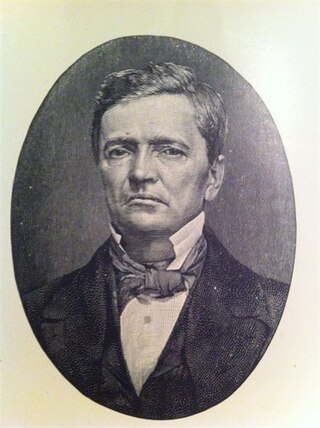
James Stephens Speed was the ninth Mayor of Louisville, Kentucky.
John Barbee was the tenth Mayor of Louisville, Kentucky from 1855 to 1857 and chiefly remembered for his part in the anti-immigrant riots known as "Bloody Monday".
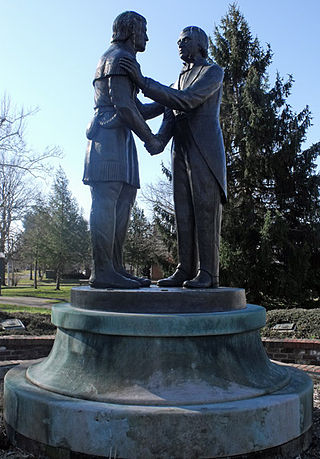
Constitution Square Historic Site is a 3-acre (0.012 km2) park and open-air museum in Danville, Kentucky. From 1937 to 2012, it was a part of the Kentucky state park system and operated by the Kentucky Department of Parks. When dedicated in 1942, it was known as John G. Weisiger Memorial State Park, honoring the brother of Emma Weisiger, who donated the land for the park. Later, it was known as Constitution Square State Shrine and then Constitution Square State Historic Site. On March 6, 2012, the Department of Parks ceded control of the site to the county government of Boyle County, Kentucky, and its name was then changed to Constitution Square Historic Site.
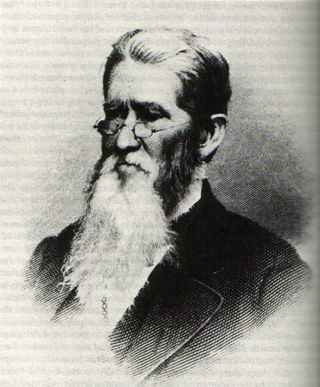
Robert Jefferson Breckinridge was a politician and Presbyterian minister. He was a member of the Breckinridge family of Kentucky, the son of Senator John Breckinridge.
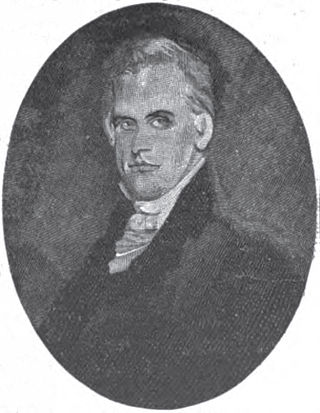
Samuel McDowell was a soldier in three wars and political leader in Virginia and Kentucky. He served under George Washington in the French and Indian War, as an aide-de-camp to Isaac Shelby in Lord Dunmore's War, and under Nathanael Greene during the Revolutionary War. He then relocated to Kentucky and became a surveyor. Later, he was appointed one of the first district court judges in what would become the state of Kentucky. He became a leader of the movement to separate Kentucky from Virginia, and presided over nine of the state's ten constitutional conventions. He was the father of Dr. Ephraim McDowell.
Thomas Allin was a soldier and surveyor who became an early settler and political leader in Kentucky. He served in the Revolutionary War, first in the North Carolina militia and then as part of general Nathanael Greene's campaign.
George Muter was an early settler of Kentucky and served as chief justice of the Kentucky Court of Appeals.
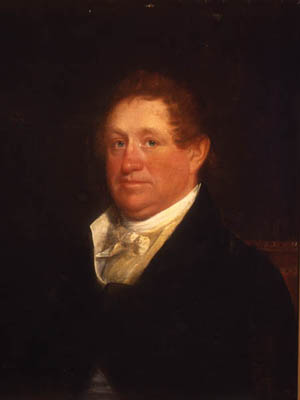
Peyton Short was a land speculator and politician in Kentucky. He was a member of the first Kentucky Senate. He was the brother of William Short; he married the daughter of John Cleves Symmes, and was a brother-in-law of future President William Henry Harrison.

Harry Innes was a Virginia lawyer and patriot during the American Revolutionary War who became a local judge and prosecutor as well as helped establish the state of Kentucky, before he accepted appointment as United States district judge of the United States District Court for the District of Kentucky and served until his death.